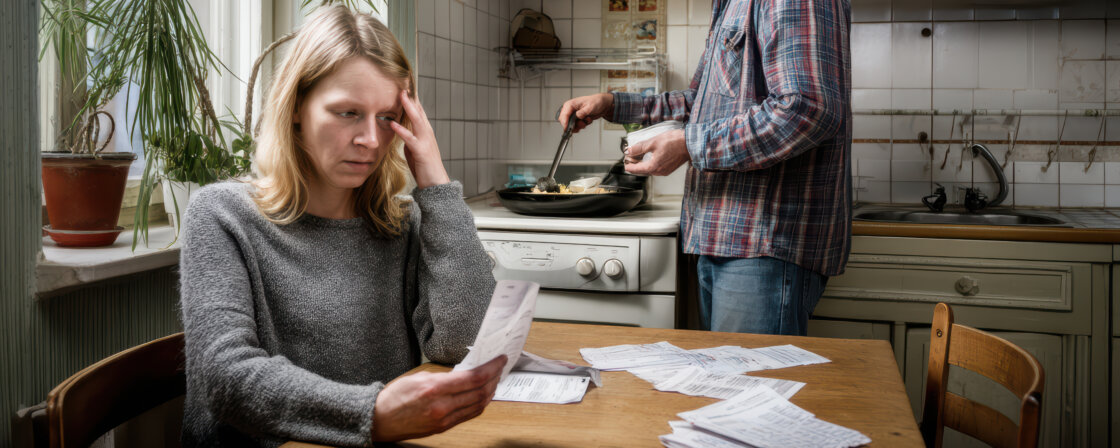A rule change that hurts: Who lost support
The Superdose was intended to simplify the complex benefits system and target aid more effectively. But in practice, some groups can lose hundreds or thousands of crowns a month. The change will be felt most acutely by people living alone in rented accommodation – typically seniors or working individuals in big cities. The new norms, which determine reasonable housing costs, are significantly lower for this group than before. For example, a single person in a commercial rental in Prague received an allowance of up to CZK 17 928 according to the previous rules. However, the super allowance is calculated at only CZK 10 500 (or CZK 13 500 for vulnerable persons), which is a decrease that is not realistically compensable by current income.
The impact is also felt by single parents. In the past, they could draw a combination of child benefit, housing benefit and subsistence allowance. Now, everything is merged into one benefit that in some cases does not even cover what they were previously receiving – for example, because of the new caps on eligible costs or because their household is not considered vulnerable.
And it’s not just about the money. Some people have lost their entitlement to the benefit altogether – for example, because they have two cars or higher savings, even though their income has remained low. So, paradoxically, the new system penalises those who try to be financially responsible but find themselves in a difficult situation.
Are you solving a similar problem?
Do you need help with social benefits?
Getting to grips with the new system can be tricky. Our lawyers can help you get what you’re entitled to quickly and efficiently – in a way that’s easy to understand and without unnecessary delays.
More information
- When you order, you know what you will get and how much it will cost.
- We handle everything online or in person at one of our 6 offices.
- We handle 8 out of 10 requests within 2 working days.
- We have specialists for every field of law.
When savings hurt: Who can’t get help because of the means test
One of the biggest innovations of the superannuation is the introduction of the means test. This was designed to ensure that people with sufficient reserves do not receive state aid. In practice, however, this means that those who have low incomes but have managed to save some money in the past – for example, because of foresight or responsibility towards children – often do not qualify for the benefit.
The superannuation has clearly defined limits: a household of one person can have a maximum of CZK 200 000 in savings; for each additional member, the limit increases by CZK 50 000 to a maximum of CZK 400 000. This does not include funds in building societies or pension savings, but current account balances, cash or savings account balances, for example, do count. The bigger problem, however, is not the limits themselves – but their inflexibility and mistrust of applicants.
The Jobcentre can find out the account balance from the bank, but it relies heavily on what the claimant says. This leads to paradoxes – those who can “invisibly” decompose assets (e.g. investments, cryptocurrencies, leased cars) will pass easily. Those who have honestly saved for a rainy day in an account will lose the benefit.
The fundamental problem is that the state can’t distinguish between the savings of responsible households and hidden assets, so the system punishes the very people who have tried to be financially prudent.
Tip for article
With the advent of the so-called super allowance, the entire system of state housing support has changed. Instead of the housing allowance and housing supplement, there is a new Housing component – one of the parts of the single state social assistance benefit. Who will qualify for it, what affects its amount and how to make a proper application? In this article you will find a practical overview that will help you not to get lost in the new rules.
The calculator came up with more, but the reality surprised
Many people who tried an indicative calculation in the MLSA’s online calculator before applying for the super benefit experienced an unpleasant surprise after the office’s decision. Although the calculator showed that they were entitled to help – and even came up with a specific amount – the reality was different. The result was far from binding and often did not correspond to the actual calculation by the Labour Office.
There are several reasons for this. The calculator does not take into account a range of details that in practice affect the amount of benefit – from asset assessments, to specific housing costs, to specific living situations such as alternate care, maintenance, or the transition between different forms of housing. The complexity of the system means that even a well-intentioned estimate can be off by hundreds or thousands of crowns.
For example, a single mother with one child, rent in a smaller town and a low income could expect a benefit of around CZK 9 000 according to the calculator. But after providing all the documents, the calculation came back with only CZK 5 800 – because of the higher value of her car and her income, which the calculator did not take into account correctly.
Another problem is that claimants often have no idea what they have to prove and how exactly their situation is assessed. The result is frustration, uncertainty and sometimes distrust of the whole system. The calculator can help with guidance, but it is certainly not sufficient for an accurate calculation.
The digital trap: When the barrier is not poverty but internet access
While the Superdose is intended to streamline assistance to those in need, in practice it has become something of a digital trap for some households. The ability to apply electronically was supposed to be a simplification – yet for many people, it is the digital environment that is the main barrier.
The Jenda system that processes applications requires a bank identity or other form of electronic identity verification. But for people in foreclosure, seniors without a smartphone or households without an internet connection, logging into the system is often impossible. It’s not just the application itself – tracking it, filling in missing documents or communicating with the office is also a problem.
Social counselling services report that the digital barrier is more common than financial deprivation. People need help not only with filling in the application, but also with navigating the forms or understanding the outputs from the calculator. Younger claimants are no exception – those who have grown up in children’s homes, for example, or come from unsupported backgrounds, often do not have the skills or facilities they need.
Although it is still possible to apply in person, waiting times at offices are long and staff availability is limited. Digital poverty thus poses a real threat to the chance of receiving state assistance – not because of non-compliance, but because of technological disconnection. Only targeted assistance and systematic work by NGOs can help.
Tip for article
Want to get an idea of whether you might qualify for a super allowance and how much? Try the indicative calculator.
When the dose is not enough: What to do when the superdose does not cover basic needs
The superdose was meant to combine four different doses into one simpler system and offer more effective help. In practice, however, it is proving inadequate for many people, especially where the cost of living is high or household income is just above the calculation threshold. If the super benefit does not cover even basic needs, there are other options to address the situation – people are just often unaware of them or afraid to ask for help.
The first step should be to consult a social worker or Citizens Advice Bureau – they can help assess eligibility for other forms of state support. For example, emergency emergency assistance, which is provided in crisis situations such as loss of housing, unexpected expenses or health emergencies, may be an option. However, it is important to prove that the household is unable to meet these costs on its own.
Another option is to apply for a humanitarian benefit or to use one of the forms of assistance from the municipality, charity or foundation. Some municipalities also provide their own crisis funds or housing allowances over and above state aid.
It is also worth checking whether the household does not qualify as ‘vulnerable’ – for example, due to caring for a child under 3, disability or advanced age. In these cases, the super benefit may be higher.
The worst mistake is not to address the situation at all – even if the system is not perfect, help is available. You just need to know where to turn.
Summary
The super-dose, which replaced the four original doses, brought a simpler system but also a number of new problems. For many people – particularly those in commercial tenancies, single people or those with no income – support has been significantly reduced due to a recalculation of the standard costs. Another barrier is the means test, which means that even those with only basic savings or a car will not qualify for the benefit. Many claimants were caught out by the difference between the result of the online calculator and the actual benefit amount, which often did not take into account their specific situation. The digital barrier is also a significant problem – people without internet access or digital skills find it difficult to submit, track or edit their claim. Finally, even when they do receive the benefit, it is often insufficient to cover basic needs. In these cases, it is necessary to actively seek other forms of support – for example, emergency relief, humanitarian benefits or assistance from the municipality and NGOs. The whole system thus shows that the most vulnerable are not only the poorest, but also those who do not have access to information, technology or legal advice.
Frequently Asked Questions
Why did the super dose come in lower than the calculator showed?
The online calculator is only used as a guide and often does not take into account household specifics such as atypical income or housing type.
I have savings of less than CZK 200 000, but the benefit was not approved. Why?
The means test counts not only your account balance but also other assets – for example, a second property or an extra car.
What should I do if I can't manage to apply online?
It can be submitted in person at the Labour Office or with the assistance of social workers or civic counselling centres.
The super allowance isn't enough to pay my rent and food. Where do I turn?
Ask for emergency help or speak to the Citizens Advice Bureau for help with other support options.




